Delays in Brazil's 2014 World Cup works recall 1950
- Published
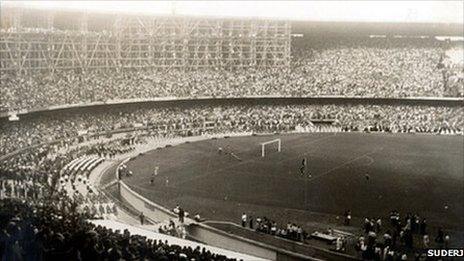
A friendly between Brazil and Mexico was the Maracana's inaugural game
In just under 33 months' time, Rio de Janeiro's Maracana football stadium is set to host the final match of the 2014 Fifa World Cup and crown what all Brazilians hope will be a successful tournament.
But delays in the renovation works that began in August 2010 have had Fifa officials casting a worried eye over the pace of rebuilding at the Maracana.
The stadium actually needs to be ready in good time to stage the Fifa Confederations Cup, external in June 2013.
The current worries recall similar fears of more than 60 years ago, when the stadium was being built in a rush to host Brazil's first and, to date, only World Cup, in 1950.
"At that time we had this gloomy prospect that things wouldn't work, that the stadium wouldn't be ready on time," says veteran sports commentator Teixeira Heizer.
Back then, Rio's main football stadium, Sao Januario, built in 1927, held 40,000 spectators.
The plan was to build the biggest stadium in the world with a capacity of some 155,000 - an aim that caused as much pride as disbelief.
"We couldn't believe that Brazil was building a stadium like that. It was something unmatched in the world. There was this painful expectation that we wouldn't make it on time, just as today," says Mr Heizer.
Away win
The Brazilian tournament organisers did make it on time but only just. A week before the World Cup kicked off, the Maracana was inaugurated with a friendly match between teams from Rio and Sao Paulo.
The guests beat the hosts, perhaps foreshadowing what was to come in the World Cup final.
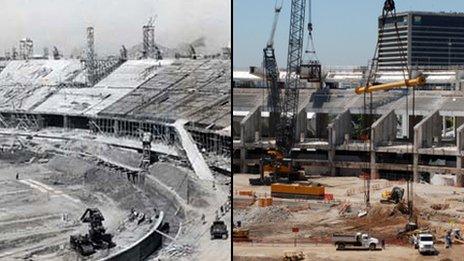
Then - and now: Renovation is taking at least as long as the initial build
While the Maracana was able to stage a game, the stadium was not actually complete.
Journalist Joao Maximo remembers the opening game when scaffolding was still on the stands to keep the roof in place.
"There were wooden structures beside the roof, which left the strong impression that the stadium was unfinished," he says.
Many final touches were missing, and the stadium's construction was only concluded in 1965, according to the state company that runs Maracana, Suderj.
Mr Maximo was a teenager in 1950s and lived in a neighbourhood right next to where the stadium was being built on the grounds of a former horserace track.
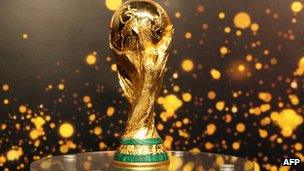
Eyes on the prize: Brazil wants to win the World Cup at home
Every Saturday, he and his friends would go over to look at the building works.
"We kids liked football and we didn't have much to do, so we were really excited by how it was coming along."
Mr Maximo attended all the World Cup matches, and still keeps the tickets.
He remembers the festive atmosphere of the opening match.
"The firemen's band played, pigeons and balloons were released and the Brazilian team had an easy win. Mexico wasn't much of a threat."
World showcase
The 1950 World Cup had just 13 participating countries, unlike the 32 finalists due in Brazil.
It was the fourth World Cup to be held, but perhaps more importantly, it was the first one after World War II.
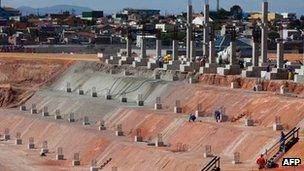
A new stadium in Sao Paulo will host the opening match in 2014
Portugal and Scotland were among the nations to decline the invitation to take part, and Germany and Japan were banned from the competition.
"Europe was rising from the ashes. The only reason why the World Cup was held in Brazil was that nobody else wanted to host it," says Mr Heizer.
Even though there was no television broadcasts of the matches, Mr Heizer says the event was seen as a good opportunity for Brazil to show itself to the world.
The aim was not only to show that Brazil could build a major new stadium, but also become world champions.
"The Maracana was built for Brazil to win the World Cup. We youngsters had this very strong belief in our heads," says Mr Maximo.
That plan went wrong in the epic final that came to be known to Brazilians as Maracanazo - a single word that summed up a nation's disbelief and heartache at defeat in the Brazil v Uruguay final.
With the two sides tied at 1-1, Uruguay's Ghiggia scored with just 11 minutes to go to seal victory.
The goal was announced nine times in a row by Radio Globo's commentator Luiz Mendes, each time with a different inflection, echoing the agony in the stadium, crammed with 200,000 spectators.
"That match changed Brazilian football. I have the impression that it was due to that match that Brazil organised itself to become the world's greatest football power," says Mr Heizer.
But the trauma has lived on, and younger generations still hear about the "tragedy" of the 1950 final.
Brazil has a chance to lay the ghosts of 1950 to rest, but the national side first has a big challenge to overcome: they will only play in the Maracana if they make it to the final.
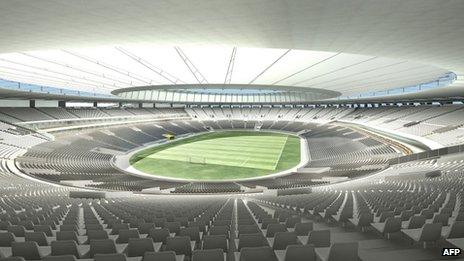
This is how the Maracana is due to look once renovation is completed
Editing by Liz Throssell, BBC News
- Published17 September 2011
- Published30 June 2011
- Published30 June 2011
- Published30 June 2011